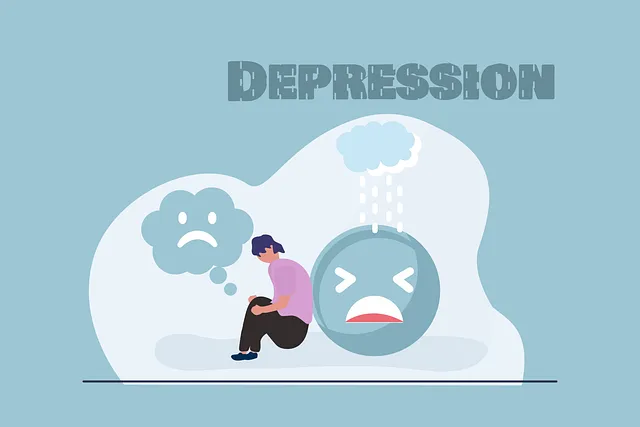The Boulder Kaiser Permanente mental health facility leads the way in community mental wellness through comprehensive public awareness campaigns. They utilize diverse strategies like social media, events, and workshops to educate, reduce stigma, and encourage early support-seeking. Their holistic approach caters to varied needs, offering programs like Mental Wellness Coaching and self-esteem improvement activities. By fostering emotional intelligence and promoting tailored self-care, the facility empowers individuals to prioritize mental health. Their successful initiatives, including interactive webinars and community partnerships, serve as a model for effective public engagement in mental health advocacy, ensuring programs have lasting impacts on community well-being.
Public awareness campaigns play a pivotal role in addressing critical issues like mental health, especially within communities like Boulder where organizations like Kaiser Permanente are making strides. This article delves into the development of effective public mental health awareness campaigns, drawing insights from Boulder Kaiser Permanente’s community outreach initiatives. We explore strategies for engaging diverse audiences and measuring campaign success, providing valuable tools for creating impactful programs at this leading mental health facility.
- Understanding Public Awareness Campaigns for Mental Health
- The Role of Boulder Kaiser Permanente in Community Outreach
- Strategies to Design Effective Mental Health Awareness Programs
- Engaging Target Audiences: Techniques and Tools
- Measuring Success: Evaluating the Impact of Public Awareness Campaigns
Understanding Public Awareness Campaigns for Mental Health

Public awareness campaigns play a pivotal role in educating communities about mental health, fostering understanding, and reducing stigma. At facilities like Boulder Kaiser Permanente mental health facility, these initiatives are crucial in promoting overall well-being. Such campaigns often employ various strategies to engage the public, from social media awareness to community events and partnerships with local organizations.
They aim to destigmatize conversations around mental health, encouraging individuals to seek support early on. For instance, Boulder Kaiser Permanente has initiated programs like Mental Wellness Coaching to empower individuals with self-care techniques and conflict resolution techniques for better mental wellness improvement. These efforts are further strengthened by promoting self-esteem improvement activities, ensuring a holistic approach to mental health care that resonates with the diverse needs of the community.
The Role of Boulder Kaiser Permanente in Community Outreach

Boulder Kaiser Permanente stands as a beacon of hope and healing within the community, showcasing the power of comprehensive mental health services. As a leading mental health facility, they actively engage in community outreach programs, recognizing the vital role public awareness plays in fostering well-being. Through these initiatives, Boulder Kaiser Permanente aims to destigmatize mental health conversations and empower individuals with tools for self-care.
Their approach emphasizes emotional intelligence as a cornerstone of their strategy. By organizing workshops, seminars, and informational sessions, they educate residents on the importance of recognizing and managing their emotional well-being. Furthermore, Boulder Kaiser Permanente promotes the development of self-care routines tailored to individual needs, encouraging positive thinking and resilience. These efforts not only cater to the immediate community but also contribute to a broader cultural shift towards prioritizing mental health and overall wellness.
Strategies to Design Effective Mental Health Awareness Programs

Designing effective mental health awareness programs requires a multi-faceted approach tailored to engage and educate diverse communities. At Boulder Kaiser Permanente mental health facility, we’ve found success through collaborative initiatives that blend education, support groups, and accessible resources. Engaging experts from various fields, such as psychologists, psychiatrists, and community leaders, ensures content relevance and cultural sensitivity.
Implementing interactive workshops focusing on emotional healing processes, stress management, and communication strategies has proven effective in fostering open dialogue and building coping mechanisms. Leveraging technology for online resources and virtual support groups further broadens accessibility, addressing barriers to care. By combining these strategies, mental health awareness programs can create lasting impacts, promoting wellness and improving overall community well-being.
Engaging Target Audiences: Techniques and Tools

Engaging Target Audiences plays a pivotal role in the success of public awareness campaigns, especially when addressing sensitive topics like mental health. At the Boulder Kaiser Permanente mental health facility, organizers employ diverse techniques to connect with their audience effectively. This includes leveraging social media platforms to share relatable content, host interactive webinars, and create engaging videos that demystify mental health issues and offer practical Stress Reduction Methods. By using these tools, they ensure that their message reaches a broader spectrum of people, fostering open dialogue about mental well-being.
Furthermore, the facility leverages community partnerships and local events to provide Crisis Intervention Guidance tailored to specific demographics. This multi-faceted approach not only increases awareness but also empowers individuals with Self-Esteem Improvement strategies, ensuring they feel equipped to handle their mental health proactively. Through these innovative practices, Boulder Kaiser Permanente sets an example for effective public engagement in the field of mental health advocacy.
Measuring Success: Evaluating the Impact of Public Awareness Campaigns

Measuring the success of public awareness campaigns is an essential step to understand their impact and inform future strategies. When it comes to initiatives focused on mental health, such as those conducted by Boulder Kaiser Permanente, evaluating outcomes goes beyond mere reach or engagement. It involves assessing changes in behavior, attitudes, and knowledge related to the targeted issues. For instance, a campaign aimed at promoting self-care practices among young adults might measure success through increased adoption of healthy habits and improved emotional intelligence.
By utilizing surveys, focus groups, and analyzing data from mental health facilities like Boulder Kaiser Permanente, campaign organizers can gauge whether their efforts have led to a confidence boost in individuals seeking support. This evaluation process allows for continuous improvement, ensuring that campaigns remain relevant and effective in addressing the ever-evolving needs of the community.
Public awareness campaigns play a pivotal role in educating communities about mental health, and the successful initiatives at Boulder Kaiser Permanente serve as a compelling example. By employing strategic outreach methods and engaging target audiences, these campaigns can significantly impact community well-being. Understanding the unique needs of diverse populations and utilizing effective program design principles are key to creating lasting change. Measuring success through evaluation ensures that efforts remain focused on improving mental health outcomes, ultimately fostering a more informed and supportive society for those facing such challenges.



